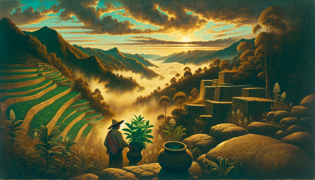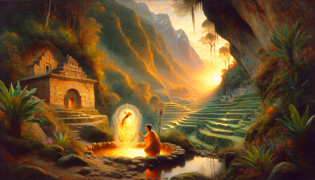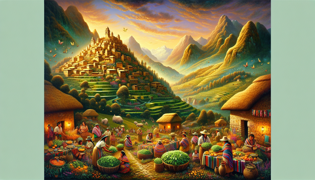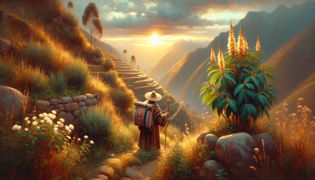Mama Coca: Guardian of the Andean Leaf
Reading Time: 10 min

About Story: Mama Coca: Guardian of the Andean Leaf is a Myth from bolivia set in the Ancient. This Poetic tale explores themes of Nature and is suitable for All Ages. It offers Cultural insights. An evocative myth of healing, fertility, and mountain spirits entwined in emerald foliage.
Introduction
At the realm’s edge, where soaring condors wheel like living punctuation marks, the coca plant nestles between cracked stones and frosted dew. Farmers say they can taste its sweet life on their tongues, like the first promise of rain. In villages set against serrated peaks, they murmur, “¡Pucha, qué bendición!”, when the leaf unfurls bright as an emerald fan. Children learn to cradle its velvet texture before birth, wrapping tiny fingers around the leaf’s central vein as if grasping the world’s pulse.
Long ago, earth tremors split the sky’s mirror, and from that rift rose a goddess with hair of dew‑drenched grass. She was Mama Coca, the living breath of Pachamama herself, gifted to heal wounds and bless fields. Her laughter rattled distant glaciers like a thousand chimes, her tears formed hidden streams under moonlight. Even the wind carried her lullaby—a melody as soft and elusive as dragonfly wings.
Yet not every heart recognised her boon. Some saw a simple leaf, ignorant of its veins’ shimmering network, veins that chattered like secret tongues in darkness. Others feared its power as one dreads the sky’s fury before a storm, forgetting that rain can also bring renewal. In time, this ambivalence summoned a trial: a drought so relentless that the rivers hardened into stone, and crops wilted like forgotten hopes.
It was then that Juana, a humble herbalist blessed with unerring intuition, felt a tremor in her chest. The coca’s heartbeat echoed within her. With a fringed cloak and clay pot of healing salves, she set out at dawn’s first blush, her path lit by rosy fingers stretching across the mountains. The air smelled of earth’s sweet musk and distant pine smoke. A murmur of unseen streams underfoot bade her onward. And so our story begins.
Quest to the Hidden Spring
Juana’s journey wound through valleys painted in autumn ochre, each hill crowned with golden ichu grass whispering like restless spirits. The wind roared like a seashell pressed to her ear, carrying faint notes of distant drums. As she climbed, the air grew thinner; each breath tasted of ancient stone and lingering incense from village shrines. A fox darted through bracken, its coat a bruise of russet fire; it paused, nose twitching, then vanished like a candle flicker.
She recited an old chant—an echo of mothers long gone—invoking Apus Illimani and Sajama to watch over her steps. A distant rumble, half thunder, half heartbeat, suggested that the mountains themselves stirred to greet her. Under a carved stone archway, weathered by wind and centuries, she found the entrance to a hidden gorge. Moss clung like emerald velvet, and trickles of water made the rock glisten as though encrusted with sapphires.
Inside, the cavern’s hush felt like holding one’s breath underwater. The air tasted metallic, with a faint tang of pollen. Torches flickered against walls ribbed like whale-bone, shadows dancing like ephemeral dancers. She pressed her palm to jagged rock; it was wet and cool, pulsing gently, as if the mountain’s blood ran within. Drawing from her satchel a handful of coca leaves, she laid them upon an altar of shale and chanted, voice quivering like a taut bowstring.
Suddenly, a shaft of moonlight pierced the grotto’s ceiling, spotlighting a crystalline pool. The water shimmered with living light, and ripples shaped themselves into visions—smiling children, flourishing maize stalks, mothers cradling babes. Her heart swelled: Mama Coca’s promise was at hand. But as she knelt to drink, a low voice echoed from the darkness: “¿Quién osa perturbar mi sueño?”
A spectral form emerged—an elder woman with eyes like molten copper and robes woven from dripping ivy. Her presence smelled of damp earth and distant fire. Juana rose, trembling yet resolute, offering the leaves. “Oh madre de hojas sagradas, vengo con humildad.” The goddess inclined her crown of coca blossoms, a regal nod that stirred the cavern’s stillness into a living hush. Thus began the covenant between mortal and deity, sealed by breath and leaf, in a moment as fragile as spun glass yet as enduring as the mountains themselves.

Trial of the Drought Gods
When Juana emerged, the sun burned like molten gold overhead, and the valley lay parched under its glare. The once‑murmuring riverbed was a cracked mosaic of clay. Farmers crouched beside stubby stalks of millet, their eyes hollow as dry gourds. Juana lifted her gaze to Mama Coca’s goddess—no longer spectral in shadow but standing tall on a granite outcrop, crowned by swirling cotton clouds. The deity’s presence shimmered like heat‐mirages on dusty roads.
“Only through sacrifice and true respect shall the rains return,” intoned Mama Coca, her voice resonant as a stone gong. Juana knew what was asked: a portion of herself, a vow to uphold the sacred covenant, and an offering from the heart. Her pulse thrummed against her temples, a reminder that blood and leaf share kinship. From her cloak she drew a carved bone needle, its surface etched with ancient runes. The metallic scent of blood mingled with the leaf’s sweet musk as she pricked her finger, letting one drop fall atop a single coca leaf.
A distant clap of thunder startled her, rolling across peaks like gargantuan drums. Then came a rumble of wings: condors circled above, silhouettes against the sky as broad as shields. The gathering clouds darkened to indigo, and the wind carried whispers of gratitude from unseen spirits. Juana spoke her vow in Quechua, voice trembling yet clear: “Por mi familia, por mi pueblo, por Pachamama y por ti, Mama Coca.”
Below, the dry earth trembled in response. Fissures quivered open, and fine tendrils of moisture seeped upward like a bride’s veil. Rain fell in crystalline beads, tapping the parched soil in a rhythm as joyous as dancing feet at a festival. Each droplet sang promises of revival: maize would rise, tubers swell, and life return to hollow fields. Villagers cheered, stamping boots in puddles newly formed. The goddess smiled, her form dissolving into a cascade of green petals that drifted on the breeze. Juana watched them swirl around her ankles, each leaf alive with hope.
That eve, as lanterns glowed in huts and laughter echoed through wet streets, Juana sat by the riverbank, its waters now full and murmuring sweet benedictions. She cradled a sprig of coca, its veins pulsing softly. The gods of drought had been appeased, and the valley thrummed once more with melody, as vibrant and intricate as a condor’s wingbeat against a sapphire sky.

Fertility Feast of the Leaf
With fields reborn, the community prepared a grand fiesta that would honour Mama Coca’s gift. Long tables heaved under clay bowls of quinoa stew, roasted llama meat and sweet maize cakes. Candles flickered like fireflies in drifting smoke, and the air smelled of toasted kernels and coriander spice. Drums pounded a heartbeat rhythm, accompanied by panpipes weaving a melody that rose and dipped like swallows in flight.
Villagers dressed in vibrant ponchos streaked with vermillion and turquoise danced in circles, carrying woven baskets brimming with fragrant coca bundles. Elders blessed each leaf, whispering thanks in voices quavering with age and joy. “¡Chévere combinación!”, they declared, mixing tea from the leaves with honey from mountain hives. As each cup passed from palm to palm, laughter rippled like sunlit water.
Juana sat beneath an ancient wawa tree, its bark flaking like spent parchment, and watched children weave crowns of coca blossoms. The petals brushed against her cheek, soft as silken raindrops. She recalled the cavern’s hush and the goddess’s copper eyes. In that memory flickered the promise that the leaf would bring fertility not only to soil but to souls.
Then, high above, took flight a thousand butterflies—each wing a brushstroke of mauve and amber—dancing through lantern light like living confetti. The villagers fell silent as the creatures alighted on baskets of coca leaf, their fragile forms quivering as though offering themselves in tribute. A hush of awe settled like warm velvet.
Juana rose and moved forward, voice clear as mountain air: “Tonight we honour Mama Coca, not as leaf or goddess alone, but as promise—renewal, healing, unity.” She raised her cup high. The crowd echoed her, cups glinting in the firelight like clusters of dew. In that moment, the valley felt bound together by more than roots and streams; it thrummed as a single heartbeat, a living tapestry woven by the sacred green leaf.

Legacy of the Green Heart
Years folded into memory like well‑worn cloth. Juana grew older, her hair threaded with silver like moonlight on water. She taught children to revere Mama Coca’s gift: showing them how to plant a single leaf, tending it with whispered blessings before dawn’s first glow. The seedlings unfurled like tiny fans, each vein cradling stories of ancient covenant.
One spring, an outsider arrived—a wounded soldier wandering from distant wars, eyes hollow as bone dust. He coughed dryly, blood flecking his lips. Villagers whispered that no healer could mend a soldier’s soul or body. Yet Juana greeted him at dawn, offering tea brewed from the purest coca leaves, sweetened with wild cane sugar. The bitter‑sweet draught soothed his lungs like velvet bandages, healing more than flesh. He wept in gratitude, murmuring prayers to the leaf and its guardian.
Under her tutelage, the man found purpose: he helped till fields, his once‑shaky hands learning the earth’s language. He joined cicada‑driven nights of work and song, feeling his heart pulse anew. In his eyes shone a quiet wonder, as though he had discovered a secret map to life’s hidden springs.
Decades hence, when Juana’s footsteps slowed as dusk yields to night, she would sit at the threshold of her adobe home, hand resting on a coca shrub whose blossoms gleamed like stars against deep green. She whispered her farewells to the winds, trusting the next generation to hold the covenant.
They would, as long as the mountains stood, and the winds sang through coca fields, and people remembered that a single leaf can bear the weight of worlds.

Conclusion
Beneath the Andean sky, every rustle in the coca fields is a whisper from Mama Coca’s heart. Her myth endures in each droplet of dew, each rustling leaf, and every gentle breeze that slips between mountain spires. Through Juana’s courage and humility, the people learned that nature’s greatest gifts demand respect as firm as stone yet tender as a mother’s touch. The valley, once cracked by drought, now sings—its melody woven from humming crickets, burbling streams, and the rustle of sacred leaves.
Generations come and go, but the covenant lives on in the children who cradle newborns in woven shawls, placing a single coca leaf on their chests to grant them both healing and promise. Even travellers who pass by mist‑wreathed terraces join in the tradition, exclaiming “¡Chévere sensación!” as they taste the leaf’s gentle warmth. In every ritual, bright strands of hope are plaited with gratitude.
And should you wander those high valleys at dawn, listen for the hush of a leaf unfolding or the soft echo of an ancient chant. You will sense Mama Coca’s presence, a living breath that nurtures both earth and spirit. For in that green heart lies not only the promise of fertility and wellness but the timeless truth that humanity and nature grow strongest when entwined like roots beneath the fertile soil.

















